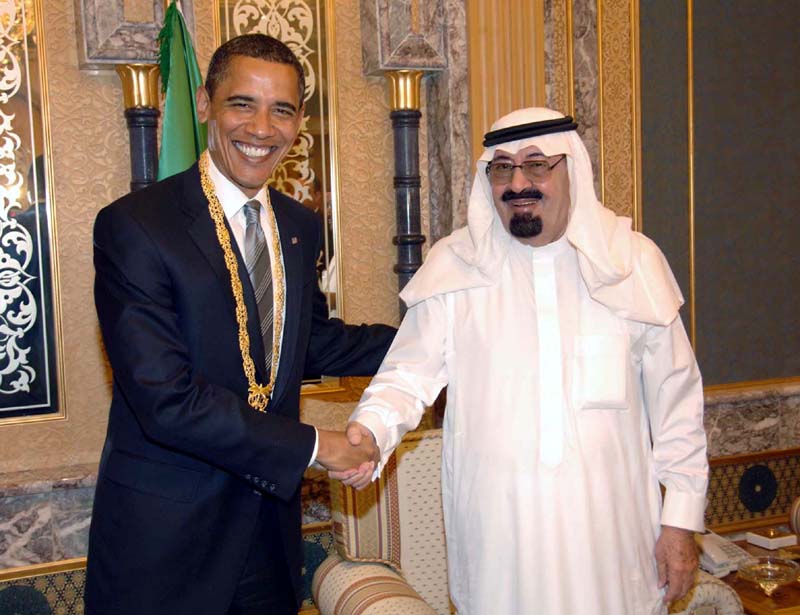
Marc Lynch’s new column at Foreign Policy explores the contradiction in Washington’s rhetoric of democracy and reform with its active support for tyranny and repression in Saudi Arabia and the surrounding Gulf states.
This is an old narrative. Yes, there is a contradiction of sorts. But Lynch and many other academics continue to lend credence to the completely empty and dishonest rhetoric of American support for human rights. Actions matter, not words. And so if we look at what matters we see that there is no contradiction; nothing but straight-forward, consistent, enthusiastic support for the worst kind of state repression and despotism.
Lynch advocates more American support for the Arab uprisings that Washington’s client states have so brutally suppressed. But he concedes the US can’t and shouldn’t “abandon its strategic posture in the Gulf — certainly not overnight.”
“What should the United States do about this changing Saudi Arabia?” Lynch asks. “Its real dependence on Saudi oil, Riyadh’s key role in the current security architecture, and the transition costs of a new strategy can’t be wished away.”
Transition costs? Please. The benefits of US geo-strategy in the Gulf go directly to Washington, and any costs of transitioning out of that posture would go directly to the state and its cohorts. When people talk about “support for the status quo” – Washington-speak for propping up authoritarian governments and actively suppressing democratic uprisings – being necessary for American interests, they aren’t really talking about your interests or my interests.
“National security interests” are just that: interests of the national security state, not of the people.“Under democracy, the rulers constantly urge the subjects to identify themselves with the state, to forget that ‘they’ (the rulers) are not ‘we’ (the ruled) and even to believe that the two groups are one and the same,” economist Robert Higgs writes in the introduction to his latest book, Delusions of power.
“In this country, the powers that be have unfortunately achieved considerable success in indoctrinating the public with this myth,” Higgs writes, “which helps explain why so many people have handed over themselves and their children to serve as cannon fodder in the rulers’ endless, unnecessary wars.” Yes, or yielded to the priorities of Washington’s “strategic interests.”
More than that, an argument could easily be made that propping up the Saudi and Gulf dictatorships is not in Washington’s interests. Geo-political and sectarian rivalries between the Arab states and Iran has been one factor pushing US policy towards an aggressive approach with the Islamic Republic. But the aggressive approach has generated a backlash in Iran and has all but ruined the chances for a diplomatic settlement on the nuclear program. This simply puts the US on the road to (needless) war with Iran, a conflict that high level US military and intelligence officials broadly agree would be a terrible blow to US interests.
Additionally, the hatred bred in the Arab world by our morally repugnant foreign policy is clearly not worth the trouble. And let’s not forget how integral Saudi Arabia’s export of Wahabism has been to the development of groups like al-Qaeda. Indeed, Saudi Arabia is now openly calling for al-Qaeda-linked groups fighting in Syria to be armed.
No amount of strategic and economic benefit to America’s rulers is worth the daily repression and abuse of human rights experienced in places like Saudi Arabia every day. Academics like Lynch need to stop buying into the empty rhetoric of US politicians and balancing Washington’s selfish interests with the interest of millions of innocent people living under tyranny.





